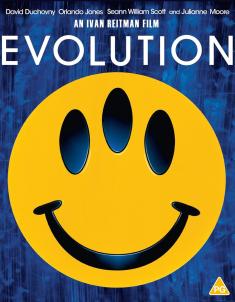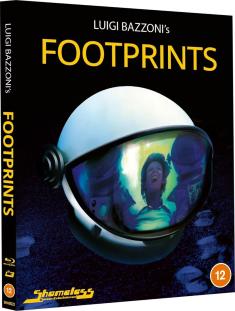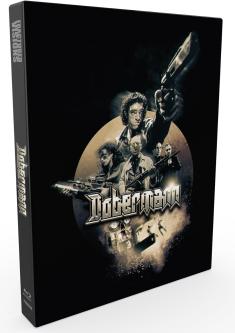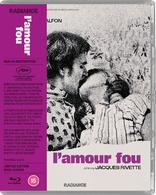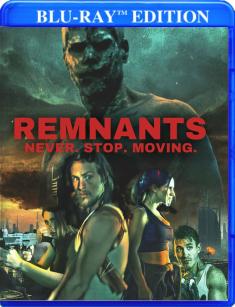Driving Miss Daisy
Overview -
Hoke Colburn sits in the front seat with his hands on the steering wheel, but the driver's seat is behind him. That's where Miss Daisy sits. She doesn't want a chauffeur and she won't give in. And neither will Hoke.
Alfred Uhry's moving Pulitzer Prize-winning play became 1989's Academy Award-winning Best Picture. Driving Miss Daisy tells of genteel but strong-willed Atlanta matron Daisy (Best Actress Oscar winner Jessica Tandy) and her patient but equally determined chauffeur Hoke (Morgan Freeman). For two people so different, they have a lot in common. And the bumpy road they travel ultimately leads to the friendship of a lifetime. From the film's nine Oscar nominations, it drove off with two more awards: Best Adaptation Screenplay (Uhry) and Makeup.
Storyline: Our Reviewer's Take

It's that time of year: Oscar time. Every year, the Academy of Motion Picture Arts and Sciences nominates what their membership believes are the best films of the past twelve months, and every year film fans all over the world cry foul. This year, nomination snubs for directors Ben Affleck and Katherine Bigelow are the rallying cry, but there's always something for people to get up in arms about. Now, I don't know what the general thought was in 1989, but looking back on that year's Best Picture winner, 'Driving Miss Daisy', I do have to wonder what the Academy was doing.
'Driving Miss Daisy' is the generally feel-good tale of an elderly Jewish woman, Daisy (Jessica Tandy), and her hired chauffer, Hoke (Morgan Freeman). At the film's start, Daisy gets into a car accident, prompting her son, Boolie (Dan Aykroyd), to hire Hoke to be Daisy's driver over her numerous protests. At first, Daisy refuses to even use Hoke's services, until she's shamed into it when he follows her down the street as she walks to town. Over time (the film spans roughly two decades), the two form an unlikely bond, ultimately becoming as close as a white woman and a black man could become in the South during the 50s-70s.
'Driving Miss Daisy' isn't a bad movie. I don't want it to seem like I'm some kind of grump who's trying to beat up on little old ladies. But it does seem a little milquetoast to be a Best Picture winner, although the Academy is hardly known for their daring. To be fair to AMPAS, both 'Born On The Fourth of July' and 'My Left Foot' were nominated for Best Picture, and those can hardly be said to be toothless films. But looking through the year's other releases, it feels like a downright crime that 'Driving Miss Daisy' would win over truly memorable films like Woody Allen's masterful 'Crimes and Misdemeanors' and Steven Soderbergh's debut, 'Sex, Lies, and Videotape.'
I can sit here all day and call out the various missteps that the Oscars have made over the years, but how is 'Driving Miss Daisy', taken on its own? Divorced of the hype, it's a gentle film anchored by two excellent lead performances. Jessica Tandy, a legendary star, is remarkable as Daisy, a woman who finds the power to change towards the end of her life. Her paranoiac hard-edge visibly softens over the course of the film, and she eventually becomes open and even loving with Hoke. This shouldn't be a surprise. Tandy originated the role of Blanche DuBois in the play 'A Streetcar Named Desire', and her powers had only grown over the years.
Morgan Freeman, now considered a grand gentleman of cinema, was less of a known commodity in 1989. Up to that point, his most notable role was as a vicious pimp in 'Street Smart'. In fact, the studio was set not to cast him in the film, but he played the role in the original stage production and his performance was powerful enough to convince the producers that he was the only man for the job. In hindsight, the decision was obviously correct, as he brings a lot of humor and good nature to Hoke, while also having the gravitas necessary to drive home the dramatic moments. It's not his best performance, but it set the tempo for the rest of his career and the public's perception of him as an actor.
Adapting the screenplay from his own stage script, author Alfred Uhry does a good job evoking the South of his youth and capturing the nuances of Daisy and Hoke's relationship. He based the roles on his real grandmother and her real driver, so there's an authenticity to the dialogue that the two actors are able to successfully translate to the screen. Australian director Bruce Beresford keeps a light touch for the most part, although he does stumble at points, such as the abrupt death of Daisy's cook, a character that is barely established and whose presence (and absence) are hardly felt. Beresford's hand gets quite heavy in segments like that.
Other problems stop the picture from being a total triumph. Hans Zimmer's saccharine score tries too hard. Dan Aykroyd feels too broad as Daisy's overbearing son, out of his element with such precise characterizations by Tandy and Freeman. And there are times where Uhry's script simply lands too sharply on the nose, such as when Daisy goes to a speech by Martin Luther King and has a dilemma over whether or not to invite Hoke inside. The film is much better when indulging in small pleasures than trying to make grand statements.
At its best, 'Driving Miss Daisy' is a pleasant trifle, something to watch once and remember fondly every once in a while. At worst, it's heavy-handed and tries too hard. But the good outweighs the bad, if you can forget that this somehow managed to pull away with Best Picture come Oscar time.
The Blu-ray: Vital Disc Stats
Warner Bros. releases 'Driving Miss Daisy' on a single-layer 25 GB Blu-ray disc, encased in digibook packaging. The book contains color photographs with interviews on the production of the film, quotes from the movie, and biographies/filmographies of the main cast and crew. Like the movie itself, it's a bit of a trifle.
Video Review

Warner Bros. presents 'Driving Miss Daisy' in its original aspect ratio of 1.85:1 for this AVC-encoded 1080p transfer. The source print, while free of scratches or other major damage, looks to have been poorly stored. The whole image looks faded and soft. Of course, many 80s film stocks tended to be soft to begin with, and Peter James' sepia-toned cinematography only increases that. However, the image looks even more faded than the stock and general style can account for. There's a lot of grain, which gives it a strong film look, but the overall softness hurts the movie. Colors feel somewhat de-saturated, although fleshtones don't look overly pale. Contrast isn't bad, and there's a reasonable amount of detail in shadows and dark scenes. There are no encoding artifacts, but there is a small amount of frame shifting. 'Driving Miss Daisy' looks better here than it has before on home video, but there's still room for improvement.
Audio Review

Warner Bros. includes the film's original stereo soundtrack in a DTS HD Master Audio 2.0 mix. There's not a lot to 'Driving Miss Daisy' sound-wise, as it's almost all dialogue. There are a few scenes that are more active, such as Daisy's trip to a relative's birthday or Hoke's infrequent trips to Boolie's office. For a 2.0 track, the sound field sounds reasonably expansive, with good balance between the dialogue, effects, and Zimmer's score. Fidelity is good, and all the voices come through loud and clear. Dynamic range is never taxed too heavily, with Zimmer's score never dipping into the low end of things. Imaging and directionality are necessarily limited. There's nothing wrong with the track as is, and it's probably better to have this than some artificial-sounding 5.1 mix created after the fact.
Special Features
- Commentary - Author Alfred Uhry, director Bruce Beresford, and producer Lili Fini Zanuck were recorded separately and edited together for this commentary from 2003. Uhry dominates the track, discussing the inspirations for the story, his reasons for writing it, and many of the character beats. Beresford is rarely heard and basically only talks about dry production details, while Lili Zanuck gives a big picture overview of the whole thing. A good commentary that helps add dimension to the movie.
- Miss Daisy's Journey: From Stage To Screen (SD, 19 min) – A decent supplement to the commentary, this featurette goes over a few of the same points, but also branches off to talk about things like the make-up effects that very justly won the Academy Award. They also talk about location shooting on a low budget and trying to recreate bygone eras of the South.
- Jessica Tandy: Theater Legend to Screen Star (SD, 7 min) – A loving tribute to Tandy, discussing her career from playing Blanche DuBois on Broadway all the way through the end of her life, and how generous of a human being she was. Tastefully done but not very meaty.
- Vintage Featurette (SD, 6 min) – Vague promotional fluff.
- Theatrical Trailer (SD, 2 min)
Final Thoughts
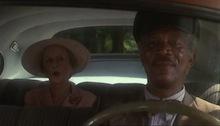
'Driving Miss Daisy' has the weight of a Best Picture Oscar on its shoulders, a burden that it doesn't deserve. Divorced from the weight of expectation, the movie ends up being a pleasant movie with interesting undercurrents. The film is at its best when it lets us enjoy the masterful performances by Jessica Tandy and Morgan Freeman, but is less successful at trying to make explicit points. This Blu-ray disc looks and sounds decent, but there's definitely room for improvement, especially in the image department. The disc also contains a small but often informative suite of features, including an HD exclusive featurette that really helps give the picture context. Fans may be happy with a purchase, but others should check it out first.






